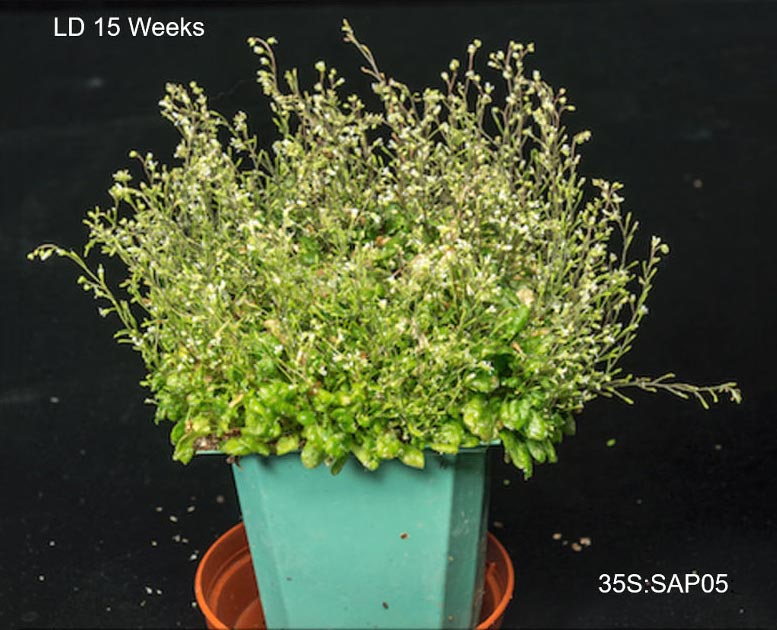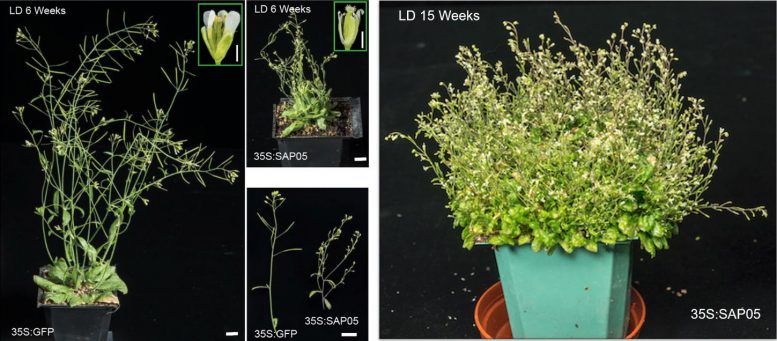
[ad_1]

The phytoplasmic effector SAP05 induces witches’ broom in Arabidopsis. Credit: John Innes Center
Zombie plants, witch’s brooms, and the curse that might contain a cure.
A recently discovered manipulation mechanism used by parasitic bacteria to slow down the aging of plants could offer new ways to protect food crops threatened by disease.
Parasites manipulate the organisms they live on to meet their needs, sometimes drastically. Under the spell of a parasite, certain plants undergo changes so important that they are called “zombies”. They stop reproducing and serve only as habitat and host for parasitic pathogens.
Until now, there has been little understanding of how this occurs at the molecular and mechanical level.
Research by the Hogenhout group at the John Innes Center and collaborators published in Cell, identified a manipulative molecule produced by Phytoplasma bacteria to hijack plant development. Inside a plant, this protein causes major growth regulators to break down, triggering abnormal growth.
Phytoplasma bacteria belong to a group of microbes known for their ability to reprogram the development of their host plants. This group of bacteria is often responsible for the “witches’ brooms” seen in trees, where an excessive number of branches grow next to each other.
These bushy growths are the result of the plant being stuck in a vegetative “zombie” state, unable to reproduce and therefore progress to an “eternally young” status.
Phytoplasma bacteria can also cause devastating crop diseases, such as aster yellows, which causes significant yield losses in grain and leafy crops like lettuce, carrots and grains.
Professor Saskia Hogenhout, corresponding author of the study, said: “Phytoplasmas are a spectacular example of how the reach of genes can extend beyond organisms to impact surrounding environments.
“Our findings shed new light on a molecular mechanism behind this extended phenotype in a way that could help solve a major problem for food production. We highlight a promising strategy for plant engineering to achieve a sustainable level of crop resistance to phytoplasmas. “
The new findings show how the bacterial protein known as SAP05 manipulates plants by taking advantage of the host’s own molecular machinery.
This machinery, called a proteasome, usually breaks down proteins that are no longer needed inside plant cells. SAP05 hijacks this process, causing plant proteins that are important in regulating growth and development to actually be thrown away at a molecular recycling center.
Without these proteins, plant development is reprogrammed to promote bacteria, triggering the growth of multiple shoots and vegetative tissues and pausing the aging of the plant.
By genetic and biochemical experiments on the model plant Arabidopsis thaliana, the team discovered in detail the role of SAP05.
Interestingly, SAP05 directly binds to both plant developmental proteins and the proteasome. Direct binding is a newly discovered way to degrade proteins. Usually, proteins that are degraded by the proteasome are pre-labeled with a molecule called ubiquitin, but this is not the case here.
The plant developmental proteins that are targeted by SAP05 are similar to proteins also found in animals. The team was curious to see if SAP05 therefore also affects the insects that carry the bacteria from plant to plant. They found that the structure of these host proteins in animals is different enough that they do not interact with SAP05 and therefore do not affect insects.
However, this investigation allowed the team to identify only two amino acids in the proteasome unit that are required to interact with SAP05. Their research has shown that if plant proteins are replaced by the two amino acids found in insect protein, they are no longer degraded by SAP05, preventing the abnormal growth of ‘witches broom’.
This discovery offers the possibility of modifying only these two amino acids in cultures, for example using gene editing technologies, to provide lasting resilience to phytoplasmas and the effects of SAP05.
Reference: “Parasitic modulation of host development by ubiquitin-independent protein degradation” by Weijie Huang, Allyson M. MacLean, Akiko Sugio, Abbas Maqbool, Marco Busscher, Shu-Ting Cho, Sophien Kamoun, Chih-Horng Kuo, Richard GH Immink and Saskia A. Hogenhout, September 17, 2021, Cell.
DOI: 10.1016 / j.cell.2021.08.029
[ad_2]
Source link